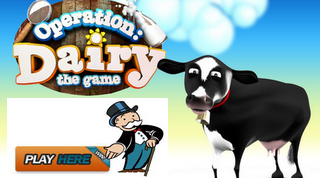Dairy in the World
FrieslandCampina Reports Higher Revenues, Reduced Profit

Profit decreased by 37.3 per cent to €227 million. In addition to negative currency translation effects the profit was lower due to write-offs of assets in China and Germany and restructuring costs.
The higher milk price was largely offset by increased revenues, however insufficient to fully compensate increases in other raw material and packaging costs. This put the margins, particularly in consumer activities, under pressure.
Sales volumes of consumer products in Southeast Asia and in Friso infant nutrition in China showed positive developments. The same applies to Africa in general. In addition, the sale of caseinates and ingredients for the pharmaceutical industry is growing.
The milk price for member dairy farmers increased significantly by 24.0 per cent to €40.01 per 100 kilos of milk (excluding VAT, at 3.47 per cent protein, 4.41 per cent fat and 4.51 per cent lactose) as a result of a higher guaranteed price for raw milk.
The value creation part of the milk price (expressed performance premium and issue of member bonds) decreased by €228 million to €142 million. Per 100 kilos of milk, the value creation decreased by 61.3 per cent to €1.33. The decrease in value creation is due to the adjustment of the profit appropriation to member farmers and the lower profit.
Hein Schumacher, CEO of Royal FrieslandCampina N.V., said: "2017 was a challenging year for FrieslandCampina. On the one hand, we have seen a positive increase in revenue and a significant increase in the milk price for our member dairy farmers.
"On the other hand, write-offs of assets in China and Germany, pressure on volume in Europe and restructuring charges reduced profit. We implemented changes to our organisation structure last year that enable us to respond faster and with a greater focus to the demands of consumers and customers. This has created a new basis for growth."
2017 Dairy Market: the year of butter
2017 was a year of recovery of dairy prices and will especially be remembered as the year of butter. The market prices for cream and butter reached a record high in the third quarter, while the price for milk protein, in the form of skimmed milk powder, declined significantly.
This caused a significant increase in the stocks of skimmed milk powder demonstrating the high volatility of the dairy market. Minor changes in conditions and sentiment can have a major impact on the supply and demand of dairy products, and consequently on prices.
Milk supply virtually unchanged
In 2017, 10,716 million kilos of milk were supplied by the Cooperative’s member dairy farmers and therefore remained virtually unchanged in comparison to 2016 (2016: 10,774 million kilos).
Together with its member dairy farmers, FrieslandCampina continues to seek for a healthy balance between milk supply by dairy farmers, processing capacity and consumers’ and customers’ demand for dairy products. Defining a long-term, structural solution with a strong emphasis on leading in sustainability in our sector will be a key challenge for this year.
Increased revenue
Revenue increased by 10.1 per cent to €12.1 billion. This is primarily resulting from higher sales prices (+11.0 per cent in comparison to 2016) and the inclusion of Engro Foods in Pakistan in the consolidated figures (+2.1 per cent).
The increase in revenue is largely due to the increased cheese prices and higher prices for butter and fat-related products in the second half of the year. The volume mix effect is -1.2 per cent due to lower volumes, particularly in Europe. Currency effects had a negative impact of -1.8 per cent on revenue.
Operating profit and profit decline
Operating profit in 2017 decreased by €119 million (-21.1 per cent) to €444 million. This decline was caused by negative currency translation effects, one-off costs and failure to fully pass on the increased cost to higher sales prices.
Currency effects (particularly the Nigerian naira and the Chinese renminbi) had a negative effect on the operating profit of €36 million (-6.4 per cent). Furthermore, incidental costs reduced the operating profit on balance by €90 million. These costs include cost for restructuring, write-offs of assets in Germany and China, and are only partly compensated by the gain on the sale of the activities of Riedel.
The cost of goods sold increased by 12.3 per cent to €10,191 million. This is mainly due to the higher price for raw milk and the increased prices for other raw materials. As a result operating profit is under pressure because price increases can only be transferred in some part to the sales prices, or with a delay.
The total compensation paid to member dairy farmers for their supplied milk increased by 22.6 per cent in 2017 to €4,346 million (2016: €3,544 million). This is the highest total compensation paid to member dairy farmers since FrieslandCampina’s inception. The increase is primarily due to the higher milk price.
The profit over 2017 decreased by 37.3 per cent to €227 million (2016: €362 million) as a result of the reduction in operating profit and a higher effective tax rate.
Decrease in operating cash flow
Cash flow from operating activities amounted to €418 million (2016: €850 million) due to an increase in working capital and lower profit. In 2017 the cash outflow for investments and acquisitions equalled to €414 million (2016: €955 million). In 2017, €531 million was invested in production capacity, and in efficiency and quality improvements. Disposals generated €96 million cash inflow.
Meadow grazing gained ground
For the second year in a row, FrieslandCampina is observing a positive momentum in the number of member dairy farms with cows grazing in the meadow. In 2017, 79.4 per cent of FrieslandCampina’s dairy farms in the Netherlands practiced some form of meadow grazing. This represents an increase of 1.2 percentage point compared to last year.
Innovation and sustainability
FrieslandCampina is focused on sustainable growth and on supplying nutritional food for the world. In 2017 FrieslandCampina invested €81 million in research & development.
Increasingly attention is focused on creating sustainable processes and products and improving the sustainability of dairy farming. Significant quantities of energy are saved in the milk drying process through means of heat recovery. To aid its dairy farmers, FrieslandCampina developed a practical model that calculates emissions of greenhouse gases related to the volumes of milk produced on individual dairy farms.
Outlook
FrieslandCampina expects global milk production to further increase in 2018. In the Netherlands, milk production is expected to remain virtually stable due to the phosphate legislation. The demand for dairy products in the European Union is expected to increase somewhat, as a result of lower market prices.
It is expected that the demand for dairy products in Asia, particularly in China, will further increase due to positive economic growth and low global market prices. Demand in other regions is also expected to increase, although to a lesser degree. The dairy market is expected to regain its balance by mid-2018 and milk prices are expected to stabilise.
FrieslandCampina’s revenue is expected to be under pressure in the first half of 2018 due to lower sales prices for basic dairy products. Another key factor is the development of the euro in relation to the US dollar and in relation to the Asian currencies. A strong euro has a negative translation effect on FrieslandCampina’s result.
To be able to optimise valorisation of member’s milk, it is key to realise a sound balance between the volume of supplied milk, FrieslandCampina’s processing capacity and market demand. In that context FrieslandCampina’s Members’ Council approved a temporary conditional measure on 21 November 2017 to regulate the milk supply. This measure can be activated during the period of 1 January up to and including 30 June 2018, should the expected supply of milk by member dairy farmers exceed FrieslandCampina’s processing capacity.
TheCattleSite News Desk






















